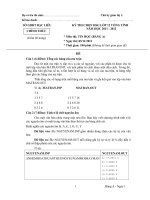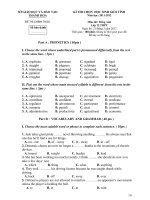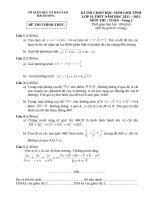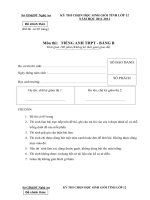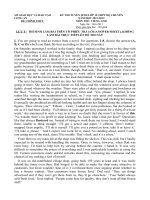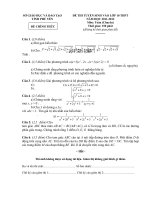Đề thi tiếng anh tuyển sinh vào lớp 10 chuyên Quảng Nam
Bạn đang xem bản rút gọn của tài liệu. Xem và tải ngay bản đầy đủ của tài liệu tại đây (147.35 KB, 5 trang )
SỞ GD&ĐT QUẢNG NAM
KỲ THI TUYỂN SINH VÀO LỚP 10 THPT CHUYÊN
NĂM HỌC 2011 – 2012
KHÓA THI: Ngày 30 tháng 6 năm 2011
MÔN TIẾNG ANH
Thời gian: 120 phút (không kể thời gian giao đề)
ĐỀ CHÍNH THỨC
SỐ PHÁCH
(Do chủ tịch HĐ chấm thi ghi)
PHẦN GHI ĐIỂM DÀNH CHO GIÁM KHẢO
Số câu đúng
Q.1: 5 câu x 0.10 đ
SECTION ONE
Q.2: 5 câu x 0.10 đ
Q.1: 10 câu x 0.10 đ
Q.2: 10 câu x 0.10 đ
SECTION TWO
Q.3: 10 câu x 0.10 đ
Q.4: 5 câu x 0.10 đ
Q.1: 15 câu x 0.10 đ
SECTION THREE
Q.2: 5 câu x 0.20 đ
Q.1: 10 câu x 0.20 đ
SECTION FOUR
Q.2: 5 câu x 0.20 đ
Điểm từng phần
…………….
…………….
…………….
…………….
Tổng điểm:
Điểm ghi bằng chữ: ...........................................................................................................................
Chữ ký giám khảo 1: ............................................ Chữ ký giám khảo 2: .........................................
Đề thi này gồm 05 trang, được đánh số từ 1-5. Thí sinh kiểm tra cẩn thận số trang trước khi làm bài.
.............................................. Thí sinh làm bài trực tiếp vào các tờ giấy thi này ..............................................
SECTION ONE. Phonetics: (1.0 point)
Question I. Choose the word whose underlined part is pronounced differently from
the others by circling A, B, C or D. (0.5 point)
1. A. cakes
B. stays
C. says
D. plays
2. A. opens
B. photographs
C. performs
D. pays
B. picked
C. laughed
D. watched
3. A. raised
4. A. cough
B. plough
C. weigh
D. though
5. A. turn
B. burn
C. curtain
D. bury
Page 1 of 5
Question II. Choose the word whose stress pattern is different from that of the others.
(0.5 point)
1. A. possession
B. property
C. industry
D. element
2. A. actual
B. pesticide
C. mineral
D. pollute
3. A. continue
B. important
C. resource
D. natural
4. A. depot
B. depend
C. describe
D. delight
5. A. decorate
B. fertilizer
C. engineer
D. socialize
SECTION TWO. Vocabulary and Grammar: (3.5 points)
Question I. Circle the best answer to complete each of the sentences below. (1.0 point)
1. He thinks it's time we .................... away with the monarchy.
A. did
B. do
C. have done
D. will do
2. I’ve known him .................... I left college.
A. until
B. during
C. since
D. when
3. .................... playing professional basketball, she also enjoys tennis.
A. Moreover
B. Besides
C. Addition
D. Together
4. .................... from Bill, all the students said they would go.
A. Except
B. Only
C. Apart
D. Separate
5. John's flat, .................... is in the same block as mine, is much larger.
A. which
B. whom
C. that
D. who
6. Did you have your photograph .................... last Sunday?
A. take
B. took
C. taking
D. taken
7. The film was so .................... that I felt .................... and sleepy during the show.
A. bored / boring B. boring / boring C. boring / bored D. bored / bored
8. What .................... you do if you .................... a king?
A. will / are
B. would / were C. would / had been D. would have / are
9. Your mother never goes on holiday by car, .....................?
A. never she
B. doesn't she
C. does she
D. does your mother
10. She said she .................... her grandmother the following day.
A. visited
B. visit
C. will visit
D. would visit
Question II. Give the correct forms of the verbs in brackets. (1.0 point)
1. That proposal (consider) ................................. by the members of the Party right now.
2. The only thing I haven't got is a garden. If I (have) ................................... one, I would
grow a lot of flowers.
3. I think your gate needs (paint) ................................... before Christmas.
4. She avoided (see) .................................. in public without her make-up on.
5. It's worth (make) ................................... an appointment before you go.
6. He often goes to work by car, but today he (go) ................................. to work by bus.
7. Were I your age, I (do) ................................... it differently.
8. My father has gone away. He (be) ................................... back in a week.
Page 2 of 5
9. If I had had breakfast this morning, I (not be) ................................... hungry now.
10. My sister is used to (take) ................................... to the zoo every Sunday.
Question III. Give the correct forms of the words in brackets. (1.0 point)
1. He was too (shame) ................................... to tell his teacher about the stupid mistake.
2. I saw your school’s (advertise) ................................... in today’s edition of the
Vietnam News.
3. Artists are (create) ................................... people.
4. If it doesn’t rain soon, there will be a great (short) ............................. of water.
5. We congratulated him on the (success) ................................. completion of the project.
6. I would like to book a (fly) ................................... to Paris.
7. They're going to announce the (arrive) ................................. of the Prince to her.
8. Peter took the (decide) ................................... to turn painting into a full-time career.
9. During his (child) .................................... the family lived in California.
10. The newly-built cinema shows a wide (vary) ................................... of films.
Question IV. Circle the underlined part in each sentence (marked A, B, C or D) that
needs correcting. (0.5 point)
1. The water and land around the chemical factory are serious polluted.
A
B
C
D
2. Although my sister was tired, but she helped me with my homework.
A
B
C
D
3. Nora has felt much better when he took the pill.
A B
C
D
4. My eldest brother is in love to the girl whose name is Alice.
A
B
C
D
5. The girl talked to me last night was really beautiful.
A
B
C
D
SECTION THREE. READING: (2.5 points)
Question I. Complete the following passage with only ONE word for each gap. (1.5
points)
WHERE DOES POLLUTION COME FROM?
Air pollution comes from factories and (1) ................. plants that burn coal and oil. (2)
................. from factories and power plants can mix (3) ................. water in the (4)
................. to make acid rain. Air pollution also comes from cars and (5) .................
vehicles that burn gasoline.
Soil pollution can come from chemicals used (6) ................. farms to kill insects and
other pests. Pollutants can also seep from (7) ................. dumps into the nearby soil and
water.
Water pollution comes from factories that dump (8) ................. chemicals into lakes and
rivers. Water pollution can also come from farms. Farmers put chemicals on the ground
to help crops (9) ................. and to kill insects. (10) ................. can wash these chemicals
into lakes and rivers.
Page 3 of 5
Big ships called oil tankers can (11) ................. the ocean if the oil leaks out (12)
................. the tankers. There can be a huge oil (13) ................. if a tanker has an
accident and sinks at sea.
A special kind of pollution comes from nuclear power plants. Nuclear power plants (14)
................. radioactive waste. This waste lasts for thousands (15) ................. years and
can cause cancer and other deadly illnesses if it is not properly stored.
Question II. The reading is followed by several questions about it. There are four
possible answers (A, B, C, or D) for each question. Circle the best one. (1.0 point)
STUDYING ABROAD
Before applying to a foreign university, one should consider the disadvantages of
studying abroad. First, a student may feel lonely by being far from home and friends.
Also, difficulty in understanding a foreign language can be very disappointing and can
affect the student’s grades. It can be very expensive to pay the costs of travel and
housing in a different country. Finally, if there is an emergency at home, it will be hard
to get home in a hurry.
However, studying in another country is advantageous in many ways. A student is
exposed to a new culture. This culture teaches him or her about other people and other
ways of thinking, which can promote friendships among countries. He can learn a new
language which may be beneficial for keeping up with research after the student has
finished studying. He can learn experience not available in his country. The student may
also get the opportunity to study at a university where a leading expert in his field may
be teaching. The leading expert can introduce the student to the most up-to-date findings
of the top researchers in the field. Exposure to such available knowledge and insights
into the field can aid the student in becoming an expert as well.
1. ......................... to study abroad.
A. There are only disadvantages
B. There are only advantages
C. There are both advantages and disadvantages
D. There are neither advantages nor disadvantages
2. When studying abroad, a student .......................... .
A. is homesick and feels lonely
B. spends a lot of money for accommodation and transportation
C. cannot go home immediately in an emergency
D. All are correct
3. When studying abroad, a student is exposed to a new culture that .......................... .
A. has no advantages
B. enriches his knowledge about people and other ways of thinking
C. has no effects
D. causes some trouble
4. At a foreign university, a student ......................... .
A. can learn a foreign language
B. cannot learn a foreign language
C. has to learn his mother tongue
D. doesn’t have to learn a language
Page 4 of 5
5. At a foreign university, a student may ......................... .
A. meet his neighbour
B. travel a lot
C. meet a leading expert in his field
D. All are correct
SECTION FOUR. WRITING: (3.0 points)
Question I. Rewrite the second sentences beginning with the words given: (2.0 points)
1/ They think the owner of the house is abroad.
- The owner ..............................................................................................................
2/ Because he studies well, he can easily pass the exam.
- Being .......................................................................................................................
3/ He couldn't afford to buy the car.
- The car ....................................................................................................................
4/ Tom is the most intelligent student in my school.
- No student ...............................................................................................................
5/ I am sorry I was rude to you last week.
- I apologize ..............................................................................................................
6/ The last time I went skiing was when we were in Switzerland.
- I haven’t ..................................................................................................................
7/ “Can I borrow your cellphone, Thuy?” asked Hung.
- Hung asked if ..........................................................................................................
8/ Although he had a bad cold, he went to work.
- In spite ....................................................................................................................
9/ We didn’t hurry, so we missed the train.
- If ..............................................................................................................................
10/ I’m always nervous when I travel by air.
- Travelling ................................................................................................................
Question II. Use the cues given to make complete sentences. (1.0 point)
1. he/ surprised/ us/ go/ away/ without/ “good bye”/ .
.........................................................................................................................................
2. before/ give/ evidence/ you/ must/ swear/ say/ truth/ .
.........................................................................................................................................
3. no matter/ cold/ he/ have/ a swim/ lake/ every morning/ .
.........................................................................................................................................
4. my wife/ not/ accustomed/ wander/ dark/ corridors/ .
.........................................................................................................................................
5. I/ used/ work/ people/ I/ not/ like/ .
.........................................................................................................................................
-------- THE END --------
Page 5 of 5

